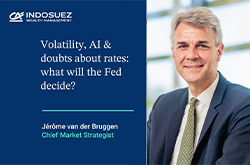ECB meeting: a missed opportunity?
Christine Lagarde's press conference held yesterday following the ECB's monetary policy meeting had the peculiarity that nothing was really expected in terms of decision making; what was at stake was the update of the inflation and growth figures and investors were essentially waiting for comments on the strength of the euro and additional equity signals. In these respects, it was a meeting without surprises or false notes; but one wonders whether Christine Lagarde did not miss an opportunity to pass on a more accommodating message given the low inflation and the resumption of the pandemic. Is this why Philip Lane spoke cautiously this morning to correct the tone?
Analysis
No change then. The ECB has left its rates unchanged and did not deem it necessary to send a signal now on the extension of the asset purchase program (EPPP) of 1350 billion euros beyond June 2021. This leads observers to focus on discourse and on updating forecasts, two elements that send a slightly different message.
In terms of forecasts, the ECB has revised its GDP forecast for the euro zone in 2020 downwards from -8.7% to -8.0%, expecting a strong recovery in the third quarter despite the identified slowdown in the services sector recovery. The ECB has also revised upwards its inflation estimate for 2021 to 1.0% and its core inflation estimate for 2022 is also revised upwards based on the positive impact of current monetary and fiscal policies. In keeping with the forecast, the ECB is therefore sending a more "hawkish" signal to the markets, which in turn pushed the euro higher against the dollar in the afternoon.
Let's now focus on the language elements, which are in line with Christine Lagarde's previous lectures, and reflect great caution in analysing the situation, highlighting for example an inflation that will remain negative until the end of the year. These remarks leave many doors open for an extension of the accommodating measures in the coming months depending on the evolution of the pandemic and the economic situation. Indeed, the President of the ECB did not fail to stress that the economic risks were essentially bearish and to express her concern about the pandemic, which remains the main risk to the recovery.
Christine Lagarde's much-awaited commentary on the currency came as no surprise, as it respects the canons of the Frankfurt institution's policy: the exchange rate is not an objective in itself, but the strength of the euro is closely monitored by the ECB for the downward pressure it induces on inflation.
Philip Lane, who prepared the groundwork on the subject a few days ago, spoke this morning to add a hint of caution to this picture, indicating that "the ECB Governing Council stood ready to intervene and adjust all its instruments if necessary to ensure that inflation evolves towards its target level". The Governor of the Banque de France also reinforced the message on the currency beyond the deflationary impact of the strong euro by recalling the negative implications for the price competitiveness of euro zone exports.
In the end, the ECB will have undoubtedly judged wiser to wait rather than anticipate, and not to over-react to the negative inflation of August (-0.2% in the euro zone). The comeback of the epidemic in the euro zone (now more cases in continental Europe than the United States), and the growing prospect of the United Kingdom leaving the EU without an agreement at the end of the year from the EU are all risks which, if they materialize, will require a monetary response. All options are therefore open for the coming months. In this context, it is legitimate to expect either an extension of the ECB's asset purchase program or a possible further reduction in rates, a measure whose effectiveness would remain questionable in terms of growth, but which would mainly benefit governments and current bondholders and which would again penalise banks unless the deposit tiering scheme is revised.
September 11, 2020




